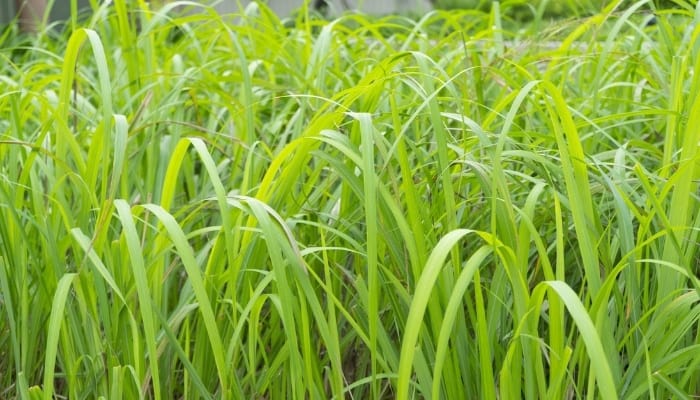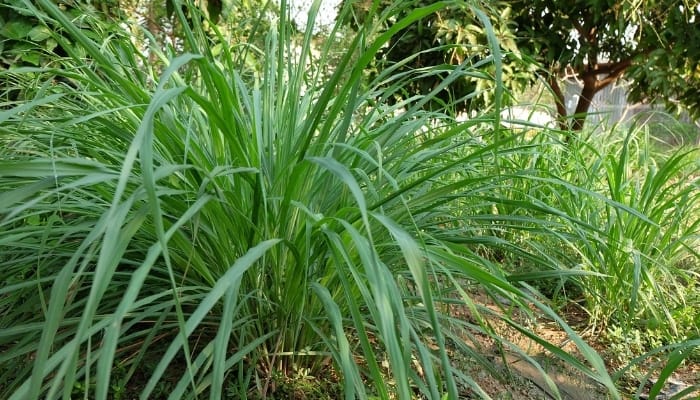Lemongrass, known for its delightful fragrance and hint of spiciness, has been a popular ingredient in both cooking and healing practices across the globe for centuries. Furthermore, it is highly valued in aromatherapy for its soothing and rejuvenating properties.
However, its effect on the non-human world can be slightly different.
What does lemongrass attract? Lemongrass can attract bees and butterflies with its pleasing scent. The former shows a particularly strong response to the aroma as it is thought to be similar to the scent produced by the queen bee and the Nasonov pheromone secreted by bees’ glands when they move to a new hive location.
Not only does it make for an uplifting plant in the home or garden, but lemongrass may also help attract the right visitors and repel the peskiest intruders.
Let’s look at the effect of lemongrass on certain creatures plus a recipe for lemongrass mosquito repellent!
What Lemongrass May Attract
This pungent plant may serve as catnip for a few beneficial insects, but the higher concentrations found in lemongrass oil are a more effective lure (or deterrent as the case may be) for certain creatures.
Pests Attracted to Lemongrass
Garden pests are normally lured in by sweet smells like flower nectar, but the sharp acidic scent of lemongrass tends to have the opposite effect.
Slugs, snails, aphids, and spider mites are drawn to lemongrass, and this plant is most vulnerable to pest visits when it spends too much time in the shade since it requires 6 hours of direct sun.
Does Lemongrass Attract Bees?
Bees can be attracted by the citral chemical given off by lemongrass plants as the scent of lemongrass is very similar to the queen bee’s pheromones, but it will take a stronger concentration to have a noticeable impact.
This is why some beekeepers swear by a swarm lure recipe containing a mix of beeswax and lemongrass essential oil to draw bee colonies to a new hive location.
Does Lemongrass Attract Bugs?
The pungent aroma of lemongrass often has a repelling effect on bugs since they are sensitive to acidity.
Lemongrass oil is often included in the ingredients of bug sprays, which claim that it is an effective barrier from bug bites.
Does Lemongrass Attract Mosquitoes?
Lemongrass oil is often cited in the list of ingredients for mosquito repellent, but there is still a lack of evidence to suggest whether lemongrass plants on their own significantly attract or repel mosquitoes either way.
Does Lemongrass Attract Wasps?
No, wasps are known to avoid the strong aroma of lemongrass. According to research published by the Journal of Pest Management Science, the active compounds within lemongrass and other essential oils demonstrated significant repellency on pestiferous social wasps.
Does Lemongrass Attract Butterflies?
The sweetly acidic citronella scent of lemongrass may lure butterflies into your garden with the promise of nectar, so it can be a worthwhile companion plant in or near your flower bed.
Does Lemongrass Attract Mice?
No. According to Mice Mob Exterminators, lemongrass has a unique smell that rodents are often deterred by.
Mice normally acclimatize to one particular scent, so the complex aroma of lemongrass can throw them off.
What Does Lemongrass Repel?

The citronella oil within lemongrass has an acute punch that doesn’t sit well with many pests and animals thus warding many off and killing some at worst.
Does Lemongrass Repel Mosquitoes?
In the form of lemongrass oil, lemongrass can absolutely repel mosquitoes! One 2011 study on the effects of plant-based oils such as lemongrass on mosquitoes and biting insects revealed that 95% of the mosquito species tested were either killed or utterly repelled by the overpowering citronella oil within.
Learn about other mosquito repellents that you can grow in your garden.
Does Lemongrass Repel Flies?
Lemongrass is considered an effective repellent against house flies, fruit flies, horse flies, and stable flies due to the citronella components citral and geraniol having a petrifying, destabilizing effect as illustrated in this study on lemongrass oil’s repellent effect on stable flies.
Does Lemongrass Repel Deer?
Deer tend to avoid plants with a highly fragrant odor. They may graze on lemongrass if no other forage is available, but generally, they will avoid it because it lacks the lush, high water content of other grass.
Does Lemongrass Repel Spiders?
Yes, the distinctive acidic fragrance in lemongrass has an earthy, menthol scent similar to eucalyptus (something spiders hate with a passion!), so it’s worth growing a potted lemongrass plant in your home around spider season.
Does Lemongrass Repel Ants?
Yes, anything with a noticeably pungent smell, like lemongrass and peppermint, can mask the pheromone trails ants rely on for navigation and finding food, so if they smell it once, they’re not likely to return!
Does Lemongrass Repel Roaches?
Lemongrass plants will certainly deter cockroaches, and the oil has been shown to kill them on contact, demonstrating 100% repellency in one such study.
Does Lemongrass Repel Fleas?
Yes, lemongrass makes a natural flea deterrent as the essential oil citronella obtained from the lemongrass plant is often added to pet sprays and flea treatments. It doesn’t kill fleas, but they are overpowered by citral and geraniol oil.
Does Lemongrass Repel Snakes?
Yes, the citrus scent released by lemongrass is considered a great snake deterrent.
Households facing snake problems are encouraged to plant lemongrass around the perimeter of their building or encircle their landscape with multiple pots of lemongrass so they can be overwintered indoors.
Does Lemongrass Repel Animals?
Cats and dogs are known to find citrus smells repugnant, so lemongrass is likely to deter them. Lizards are also among the animals put off by strong lemony scents, and the sharp blades of lemongrass plants are an additional deterrent.
How To Make Lemongrass Mosquito Repellent
You can simply add 25 drops of lemongrass essential oil to 500 milliliters of water (adding lavender or peppermint to make an especially powerful mosquito spray).
Alternatively, why not harvest your homegrown lemongrass plant and make your own spray? To do this…
1. Grab a generous handful of leaves, and place them into a large pot of water.
2. Bring the pot to a boil, stirring the leaves around to mix them well.
3. Let the mixture boil until the water turns yellow.
4. Remove the pot from heat, and allow it to sit out overnight covered with a lid.
5. Strain the mixture, and funnel into a 100-milliliter spray bottle, and you’re good to go!
Related Questions:
Is Lemongrass Harmful to Dogs?
Lemongrass plants may cause diarrhea and vomiting in dogs if consumed in large quantities.
Ingesting a small amount of the plant is unlikely to do harm, but lemongrass essential oil can cause toxicity in your dog as the higher concentration intensifies toxic chemicals known as cyanogenic glycosides.
Is Lemongrass Invasive?
Lemongrass is considered an invasive plant in tropical regions and areas with higher temperatures. In warm climates such as Mexico and Central America, lemongrass has a habit of spreading quickly into neighboring areas and becoming weedy.
Closing Thoughts
The strong scent released by lemongrass can throw small indoor pests off the trail and deter certain larger animals from disturbing your property.
The super strength of lemongrass-infused oil can be used to great effect against mosquitoes and is easy to make at home — making this a worthwhile plant to grow indoors and out!

